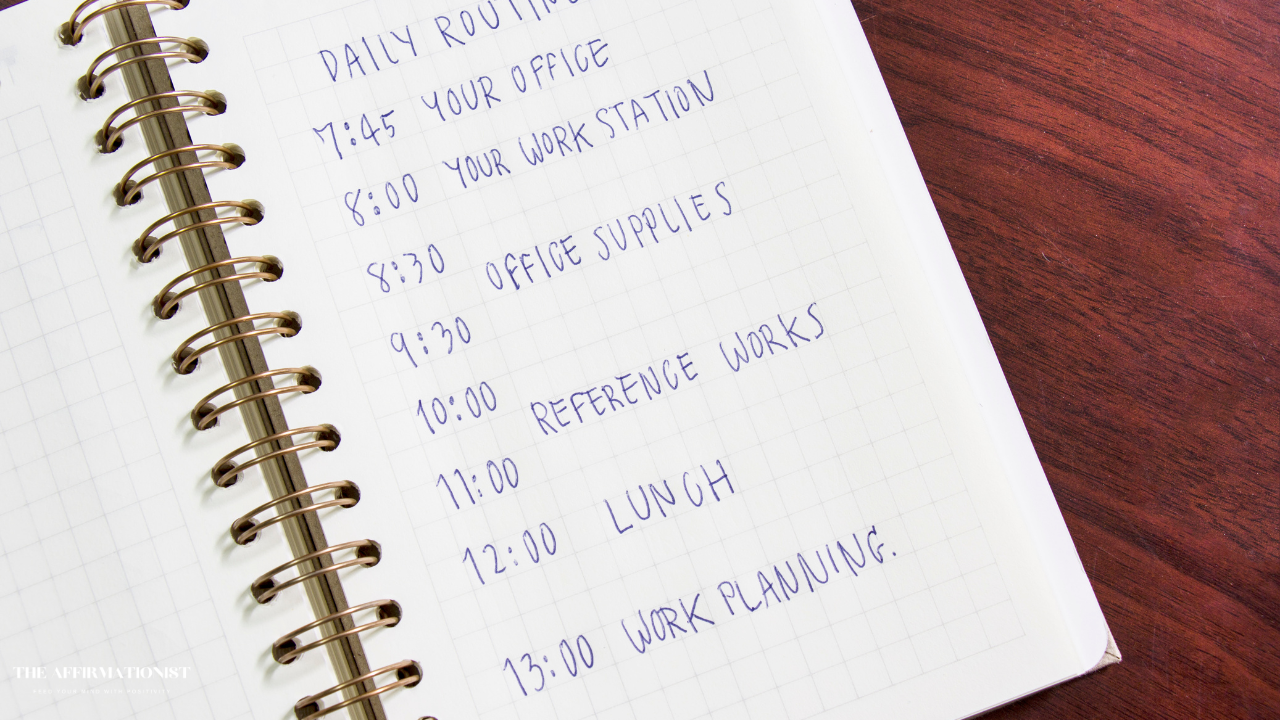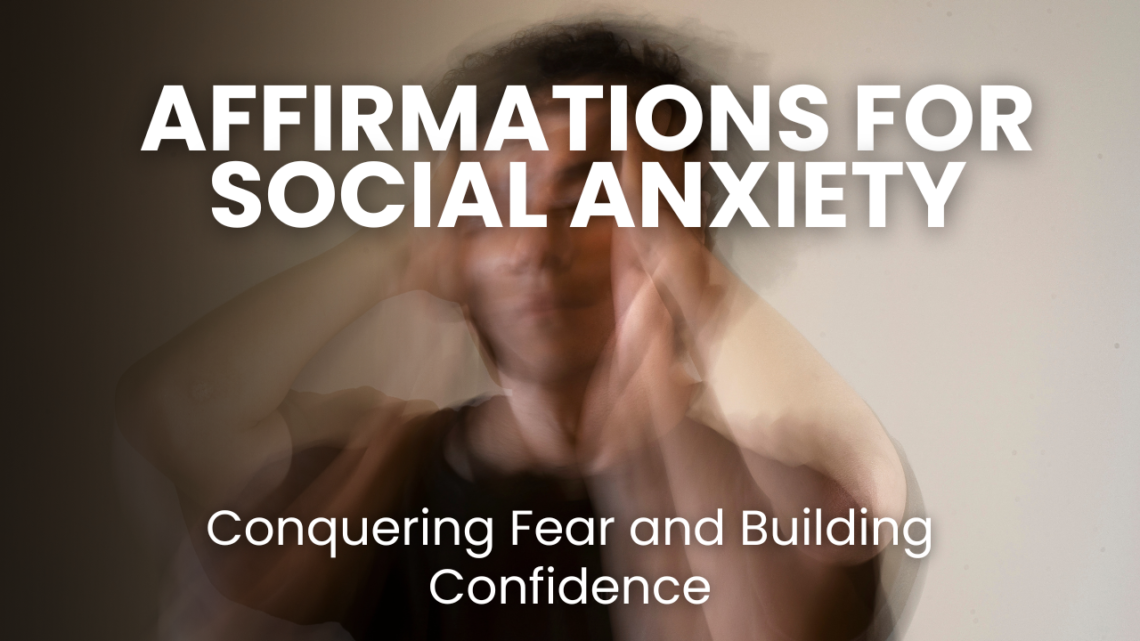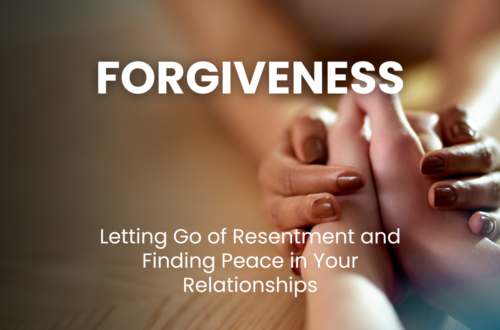Social anxiety, also known as social phobia, can be a debilitating condition that makes everyday social interactions feel like insurmountable challenges. From public speaking to casual conversations, the fear of judgment and negative evaluation can trigger intense anxiety, leading to avoidance and isolation. While professional therapy and other coping mechanisms are crucial for managing social anxiety, incorporating positive affirmations into your daily routine can be a powerful tool for shifting negative thought patterns and building self-confidence. This comprehensive guide explores the power of affirmations for social anxiety, providing practical tips, examples, and strategies for effectively using them to conquer fear and embrace social connection.
Understanding Social Anxiety and Its Impact

Social anxiety disorder (SAD), also known as social phobia, is more than just shyness. It’s a persistent and intense fear of social situations where a person might be judged, scrutinized, or humiliated by others. This fear can significantly interfere with daily life, affecting relationships, work, school, and other activities. It’s crucial to distinguish between normal social discomfort and a clinical diagnosis of SAD. Occasional nervousness before a presentation or a first date is common, but social anxiety involves a pervasive and debilitating fear that disrupts everyday functioning.
Key Characteristics of Social Anxiety:
- Intense Fear of Negative Evaluation: At the core of social anxiety lies a profound fear of being judged negatively by others. Individuals with SAD worry excessively about appearing foolish, awkward, or incompetent. They anticipate criticism, rejection, and embarrassment in social settings. This fear can be so intense that it leads to avoidance of social situations altogether.
- Physical Symptoms: The fear and anxiety associated with SAD often manifest physically. Common physical symptoms include:
- Blushing: Uncontrollable reddening of the face.
- Sweating: Excessive perspiration, even in cool environments.
- Trembling or shaking: In hands, voice, or entire body.
- Rapid heartbeat (palpitations): A feeling of the heart racing or pounding.
- Nausea or stomach upset: Butterflies in the stomach or even vomiting.
- Dizziness or lightheadedness: Feeling faint or unsteady.
- Muscle tension: Tightness or stiffness in muscles, especially in the neck and shoulders.
- Difficulty breathing or shortness of breath: Feeling like one can’t get enough air.
- Avoidance Behaviors: In an attempt to manage their anxiety, individuals with SAD often engage in avoidance behaviors. These behaviors can range from subtle to extreme:
- Avoiding social gatherings: Parties, meetings, networking events, etc.
- Avoiding public speaking: Presentations, speeches, or even speaking up in class.
- Avoiding interactions with strangers: Ordering food, asking for directions, or making small talk.
- Avoiding eye contact: Difficulty maintaining eye contact during conversations.
- Staying in the background: Blending into the crowd and avoiding attention.
- Using safety behaviors: These are actions taken to try and reduce anxiety in social situations, such as holding a drink tightly, constantly checking one’s appearance, or rehearsing what to say beforehand. While intended to help, these behaviors can often worsen anxiety in the long run.
- Negative Self-Talk and Cognitive Distortions: People with SAD often engage in negative self-talk, which reinforces their anxiety. Common negative thoughts include:
- “I’m going to make a fool of myself.”
- “Everyone is judging me.”
- “I’m not good enough.”
- “I’m going to say something stupid.”
- “I’m going to blush and everyone will notice.” These negative thoughts are often based on cognitive distortions, which are inaccurate or irrational ways of thinking. Examples include:
- Mind-reading: Assuming you know what others are thinking about you.
- Catastrophizing: Expecting the worst possible outcome.
- Personalization: Taking things personally that are not related to you.
- Anticipatory Anxiety: The anxiety associated with SAD often begins long before the actual social event. Individuals may spend days or even weeks worrying about an upcoming social situation, experiencing anticipatory anxiety. This can lead to significant distress and disruption in their daily lives.
- Impact on Daily Life: Social anxiety can have a profound impact on various aspects of life:
- Relationships: Difficulty forming and maintaining friendships and romantic relationships.
- Education: Avoiding participation in class, presentations, and group projects.
- Career: Difficulty interviewing for jobs, networking, and performing in work settings.
- Overall well-being: Increased risk of depression, substance abuse, and other mental health problems.
The Spectrum of Social Anxiety:
It’s important to recognize that social anxiety exists on a spectrum. Some individuals may experience mild social anxiety that causes occasional discomfort, while others may experience severe symptoms that significantly impair their ability to function. Regardless of the severity, seeking support and treatment can make a significant difference in managing social anxiety and improving quality of life.
By understanding the multifaceted nature of social anxiety and its impact, we can better address the challenges it presents and work towards developing effective coping mechanisms and strategies for building confidence and overcoming fear.
The Power of Affirmations: Rewiring Your Mind

Affirmations are positive statements that are repeated regularly, either aloud or silently. They are a powerful tool for challenging negative thought patterns and replacing them with more constructive and empowering beliefs. The concept behind affirmations is rooted in the idea of neuroplasticity – the brain’s ability to reorganize itself by forming new neural connections throughout life. By consistently repeating positive affirmations, you can gradually create new neural pathways that support positive thinking and self-belief, effectively “rewiring” your mind.
How Affirmations Work:
- Challenging Negative Self-Talk: Social anxiety is often fueled by negative self-talk – the inner critic that constantly whispers doubts, fears, and criticisms. Affirmations directly counter these negative thoughts by offering positive alternatives. For example, if your inner critic says, “I’m going to make a fool of myself,” an affirmation like “I am confident and capable in social situations” directly challenges that negative belief.
- Shifting Beliefs: Our beliefs shape our perceptions and behaviors. If you believe you are socially awkward or inadequate, you are more likely to act in ways that reinforce that belief. Affirmations help shift these limiting beliefs by consistently reinforcing positive alternatives. Over time, these positive statements can become ingrained as new beliefs, leading to more confident and positive behavior.
- Influencing the Subconscious Mind: The subconscious mind is responsible for many of our automatic thoughts, feelings, and behaviors. By repeatedly exposing the subconscious to positive affirmations, you can gradually reprogram it to support your goals and desires. This process can lead to more automatic positive thinking and a greater sense of self-efficacy.
- Boosting Self-Esteem and Confidence: Regularly practicing affirmations can significantly boost self-esteem and confidence. By focusing on your strengths, abilities, and positive qualities, you cultivate a stronger sense of self-worth and belief in your ability to handle challenges, including social situations.
- Reducing Stress and Anxiety: Affirmations can also have a calming effect on the nervous system. By focusing on positive and reassuring statements, you can reduce feelings of stress, anxiety, and fear. This can be especially helpful in managing anticipatory anxiety before social events.
- Promoting Positive Emotions: Affirmations can evoke positive emotions such as joy, gratitude, and confidence. These positive emotions can counteract the negative emotions associated with social anxiety, creating a more balanced and positive emotional state.
The Science Behind Affirmations:
While more research is needed, studies suggest that affirmations can have a measurable impact on the brain. Some research indicates that practicing self-affirmation can activate certain brain regions associated with self-processing and reward, leading to increased feelings of self-worth and reduced defensiveness.
Key Principles for Effective Affirmations:
- Personalization: The most effective affirmations are those that resonate deeply with you and address your specific needs and challenges. Tailor your affirmations to your individual fears and goals related to social anxiety.
- Present Tense: Frame your affirmations as if they are already true. This helps to reinforce the belief that these positive qualities are already within you. Use phrases like “I am,” “I have,” or “I feel.”
- Specificity: Be specific in your affirmations. Instead of saying “I am confident,” try “I am confident speaking in front of small groups.”
- Positive Language: Focus on what you want to achieve, rather than what you don’t want. Avoid using negative words like “not” or “don’t.”
- Repetition and Consistency: Repeat your affirmations regularly, ideally multiple times a day. Consistency is key to creating new neural pathways and reinforcing positive beliefs.
- Emotional Connection: Connect with the emotions associated with your affirmations. Visualize yourself experiencing the positive outcomes you are affirming.
Example of How Affirmations Rewire the Mind for Social Anxiety:
Let’s say someone with social anxiety has the negative thought: “I always say the wrong thing and embarrass myself.” By consistently repeating the affirmation “I communicate clearly and confidently,” they are:
- Challenging the negative thought: Directly contradicting the belief that they always say the wrong thing.
- Creating a new neural pathway: Through repetition, the affirmation becomes more familiar to the brain, strengthening the neural connections associated with confident communication.
- Shifting the underlying belief: Over time, the repeated affirmation helps to replace the negative belief with a more positive and empowering one.
By understanding the mechanisms behind affirmations and applying them consistently, individuals with social anxiety can effectively rewire their minds for greater confidence, resilience, and social connection.
How to Use Affirmations Effectively for Social Anxiety

While the concept of repeating positive statements seems simple, maximizing the benefits of affirmations for social anxiety requires a strategic approach. Here’s a breakdown of how to use them effectively:
1. Identify Your Specific Fears and Challenges:
The first step is to pinpoint the specific social situations or triggers that cause you the most anxiety. Are you afraid of public speaking? Meeting new people? Making small talk? Being the center of attention? Once you identify your specific fears, you can tailor your affirmations to address them directly.
- Example: If you’re afraid of public speaking, a general affirmation like “I am confident” might not be as effective as a more specific one like “I speak clearly and confidently in front of an audience.”
2. Craft Personalized Affirmations:
Generic affirmations can be helpful, but personalized affirmations that resonate with your individual experiences and challenges are far more powerful. Use “I” statements and focus on your desired outcome.
- Example: Instead of “People like me,” try “I am worthy of connection and I easily connect with others.” This shifts the focus from external validation to your own inherent worth and ability to connect.
3. Use Present Tense and Positive Language:
Frame your affirmations as if they are already true. This helps your subconscious mind accept them more readily. Use positive language and avoid negative words like “not,” “don’t,” or “never.”
- Example: Instead of “I will not be nervous,” say “I am calm and composed in social situations.”
4. Be Specific and Concrete:
Vague affirmations are less effective than specific and concrete ones. The more detail you include, the more vividly you can visualize the desired outcome.
- Example: Instead of “I am successful,” try “I confidently deliver presentations that engage and inform my audience.”
5. Repeat with Intention and Emotion:
Simply reciting affirmations like a mantra is not enough. You need to repeat them with intention, focus, and genuine emotion. Feel the feelings associated with the affirmation as you say it. Visualize yourself experiencing the positive outcome.
- Tip: Close your eyes, take a few deep breaths, and visualize yourself successfully navigating the social situation you’re affirming.
6. Incorporate Affirmations into Your Daily Routine:
Consistency is key. Integrate affirmations into your daily routine to reinforce positive beliefs and create new neural pathways. Here are some ideas:
- Morning routine: Start your day by repeating your affirmations while getting ready.
- Before social events: Use affirmations to calm your nerves and boost your confidence before entering a challenging social situation.
- During moments of anxiety: When you feel anxiety rising, use affirmations as a quick coping mechanism to regain control.
- Bedtime routine: End your day by reflecting on your affirmations and visualizing positive outcomes.
- Throughout the day: Set reminders on your phone or use sticky notes to prompt you to repeat your affirmations throughout the day.
7. Combine with Visualization:
Visualization is a powerful tool that complements affirmations. Imagine yourself successfully navigating the social situations you fear. See yourself acting confidently, engaging in conversations, and feeling comfortable. Combine this visualization with your affirmations for an even stronger effect.
8. Address Resistance and Negative Thoughts:
It’s common to encounter resistance from your inner critic when starting to use affirmations. Negative thoughts like “This won’t work” or “I don’t believe this” might surface. Acknowledge these thoughts without judgment and gently redirect your focus back to your affirmations.
- Tip: When a negative thought arises, counter it with a positive affirmation. For example, if you think “I’m going to make a fool of myself,” immediately respond with “I am confident and capable in social situations.”
9. Be Patient and Persistent:
It takes time and consistent effort to see significant changes. Don’t get discouraged if you don’t see results immediately. Keep practicing your affirmations regularly, and eventually, you will start to notice a shift in your thinking and behavior.
10. Combine with Other Strategies:
Affirmations are most effective when combined with other strategies for managing social anxiety, such as:
- Cognitive Behavioral Therapy (CBT): CBT helps identify and challenge negative thought patterns and develop coping mechanisms.
- Exposure Therapy: Gradually exposing yourself to feared social situations in a controlled environment.
- Mindfulness and Meditation: Practicing mindfulness can help reduce anxiety and increase self-awareness.
- Relaxation Techniques: Deep breathing, progressive muscle relaxation, and yoga can help manage physical symptoms of anxiety.
By following these guidelines, you can maximize the effectiveness of affirmations and use them as a powerful tool for overcoming social anxiety and building lasting confidence. Remember, consistency and belief in the process are key.
Powerful Affirmations for Social Anxiety
Here are some examples of affirmations you can use to address specific social anxiety triggers:



For General Social Anxiety:
- I am calm and confident in social situations.
- I am worthy of connection and belonging.
- I am capable of handling any social interaction.
- I embrace social opportunities with ease and grace.
- I am comfortable being myself around others.
- I release all fear and anxiety related to social situations.
- I am open to positive social experiences.
- I trust in my ability to connect with others.
- I am surrounded by supportive and understanding people.
- I am becoming more confident in social settings every day.
For Public Speaking:
- I am a confident and engaging speaker.
- I deliver my presentations with clarity and ease.
- I connect with my audience effortlessly.
- I am calm and composed on stage.
- My voice is strong and clear.
For Meeting New People:
- I am open to meeting new and interesting people.
- I am approachable and easy to talk to.
- I enjoy making new connections.
- I am confident in initiating conversations.
- I am comfortable sharing myself with others.
For Social Gatherings:
- I enjoy being in social gatherings.
- I feel comfortable and relaxed in social settings.
- I easily engage in conversations.
- I contribute positively to social interactions.
- I am present and enjoy the company of others.
For Fear of Judgment:
- I am worthy of love and acceptance just as I am.
- I release the need for external validation.
- I am confident in my own skin.
- I value my own opinion above others.
- I am free from the opinions of others.



Integrating Affirmations into Your Daily Routine
Consistency is key when it comes to using affirmations effectively. Integrating them into your daily routine ensures regular practice and reinforces positive beliefs over time. Here are some practical ways to incorporate affirmations into your day:

1. Morning Routine:
Starting your day with affirmations sets a positive tone and primes your mind for success.
- Upon waking: Before even getting out of bed, take a few moments to focus on your breath and repeat a few affirmations related to confidence and calmness. For example: “Today, I embrace social interactions with ease and confidence.”
- While getting ready: As you brush your teeth, shower, or get dressed, repeat affirmations related to self-acceptance and worthiness. For example: “I am worthy of connection and belonging.” “I accept myself completely, flaws and all.”
- During breakfast: While enjoying your breakfast, visualize yourself successfully navigating social situations and repeat affirmations related to your specific goals. For example, if you have a meeting that day: “I communicate clearly and confidently in meetings.”
2. Before Social Events:
Using affirmations before entering a potentially anxiety-provoking social situation can help calm your nerves and boost your confidence.
- Minutes before: Find a quiet space and take a few deep breaths. Repeat affirmations that address your specific fears related to the event. For example, if you’re attending a party: “I am comfortable and relaxed in social gatherings.” “I easily engage in conversations.”
- While traveling: If you’re traveling to the event, use the time to listen to affirmation recordings or silently repeat your affirmations.
- Just before entering: Take one last deep breath and repeat a short, powerful affirmation like: “I’ve got this.”
3. During Moments of Anxiety:
Affirmations can be a powerful tool for managing anxiety in the moment. When you feel anxiety rising, use affirmations as a quick coping mechanism to regain control.
- Recognize the trigger: As soon as you notice the physical or mental signs of anxiety (e.g., racing heart, negative thoughts), immediately shift your focus to your affirmations.
- Repeat calmly and slowly: Repeat your affirmations calmly and slowly, focusing on the meaning of the words. For example: “I am calm and in control.” “I can handle this.”
- Combine with deep breathing: Pair your affirmations with deep, slow breaths to further calm your nervous system.
4. Bedtime Routine:
Ending your day with affirmations helps to reinforce positive beliefs and promote restful sleep.
- Before falling asleep: Reflect on the positive experiences of the day and repeat affirmations related to self-acceptance and gratitude. For example: “I am grateful for all the positive connections in my life.” “I am at peace with myself.”
- Visualize positive outcomes: Visualize yourself successfully navigating future social situations and repeat affirmations related to your goals.
5. Throughout the Day:
Finding small moments throughout the day to reinforce your affirmations can significantly enhance their effectiveness.
- Set reminders: Use your phone or computer to set reminders to repeat your affirmations at specific times throughout the day.
- Use visual cues: Place sticky notes with your affirmations in visible locations, such as your bathroom mirror, computer monitor, or car dashboard.
- During breaks: Take short breaks throughout the day to focus on your breath and repeat your affirmations.
6. Affirmation Recordings and Apps:
Using pre-recorded affirmations or affirmation apps can be a convenient way to integrate affirmations into your routine.
- Listen during commutes: Listen to affirmation recordings while commuting to work or school.
- Use affirmation apps: Many apps offer guided affirmations, reminders, and visualization exercises.
7. Written Affirmations and Journaling:
Writing down your affirmations can further strengthen their impact.
- Affirmation journal: Keep a dedicated journal for writing down your affirmations and reflecting on your progress.
- Write affirmations repeatedly: Writing an affirmation multiple times can help to reinforce it in your mind.
Example Daily Schedule:
- Morning: Upon waking: “I am ready to embrace the day with confidence.” While showering: “I am worthy of love and connection.” During breakfast: “I communicate effectively and confidently.”
- Mid-morning: Reminder on phone: “I am calm and in control of my emotions.”
- Before lunch: Visualize a positive social interaction and repeat: “I connect easily with others.”
- Afternoon: During a break: “I am capable of handling any social situation.”
- Evening: Before bed: “I am grateful for all the positive experiences of today.” “I am at peace with myself.”
By consistently integrating affirmations into your daily routine, you can create a powerful habit that supports your journey towards overcoming social anxiety and building lasting confidence. Remember to be patient with yourself and celebrate your progress along the way.
Combining Affirmations with Other Strategies

While affirmations are a valuable tool for shifting mindset and building confidence, they are most effective when used in conjunction with other evidence-based strategies for managing social anxiety. Think of affirmations as one piece of a larger puzzle. Combining them with other approaches creates a more comprehensive and robust plan for overcoming social anxiety. Here’s a look at some key strategies to combine with affirmations:
1. Cognitive Behavioral Therapy (CBT):
CBT is a widely recognized and effective therapy for social anxiety. It focuses on identifying and challenging negative thought 1 patterns and developing coping mechanisms for managing anxiety in social situations.
1. www.mentalhealthassociates.com
www.mentalhealthassociates.com
- How it complements affirmations: CBT helps you identify the specific negative thoughts that fuel your social anxiety (e.g., “I’m going to make a fool of myself,” “Everyone is judging me”). You can then use affirmations to directly counter these negative thoughts and replace them with more realistic and positive ones. CBT also teaches behavioral techniques, like exposure therapy, which can be supported by affirmations.
- Example: In CBT, you might identify the thought “I’m going to blush and everyone will notice.” You could then use the affirmation “I am comfortable and confident, regardless of how I look” to challenge this thought.
2. Exposure Therapy:
Exposure therapy involves gradually exposing yourself to feared social situations in a controlled and supportive environment. This helps you confront your fears and learn that you can handle these situations without experiencing the catastrophic outcomes you anticipate.
- How it complements affirmations: Affirmations can be used before, during, and after exposure exercises to manage anxiety and reinforce positive beliefs. Before an exposure, affirmations can boost your confidence. During the exposure, they can help you stay grounded and manage anxiety. After the exposure, they can help you reinforce the positive learning experience.
- Example: Before giving a short presentation to a small group (an exposure exercise), you could use the affirmation “I am a capable and confident speaker.”
3. Mindfulness and Meditation:
Mindfulness involves paying attention to the present moment without judgment. Meditation is a practice that helps cultivate mindfulness. These techniques can help reduce overall anxiety levels and increase self-awareness.
- How it complements affirmations: Mindfulness and meditation can help you become more aware of your thoughts and feelings, including the negative thoughts that fuel your social anxiety. This awareness can make it easier to identify when you need to use affirmations. Mindfulness also helps you stay grounded in the present moment, which can be helpful during social situations.
- Example: Practicing a short mindfulness exercise before using affirmations can help you connect with the affirmations more deeply.
4. Relaxation Techniques:
Techniques like deep breathing, progressive muscle relaxation, and yoga can help manage the physical symptoms of anxiety, such as rapid heartbeat, muscle tension, and shortness of breath.
- How it complements affirmations: Combining relaxation techniques with affirmations can create a powerful combination for managing anxiety. When you’re physically relaxed, it’s easier to focus on and internalize your affirmations.
- Example: Before entering a social event, you could practice deep breathing exercises while repeating the affirmation “I am calm and relaxed.”
5. Social Skills Training:
If you struggle with specific social skills, such as initiating conversations or making small talk, social skills training can be helpful. This training can teach you practical strategies for navigating social interactions.
- How it complements affirmations: Affirmations can be used to reinforce the skills you learn in social skills training and build your confidence in using them.
- Example: After learning how to initiate a conversation, you could use the affirmation “I am confident and comfortable initiating conversations with others.”
6. Support Groups:
Connecting with others who understand your experiences can provide valuable support and reduce feelings of isolation.
- How it complements affirmations: Sharing your experiences and hearing from others in a support group can reinforce the positive messages of your affirmations and provide further encouragement.
Why Combining Strategies is Important:
- Addresses multiple facets of social anxiety: Social anxiety is a complex issue with cognitive, behavioral, and physical components. Combining strategies addresses all of these aspects.
- Provides a more comprehensive approach: Using multiple strategies provides a more robust and effective plan for managing social anxiety.
- Increases the likelihood of success: By using a combination of techniques, you increase your chances of overcoming social anxiety and achieving your goals.
By combining affirmations with these other evidence-based strategies, you can create a powerful and personalized approach to managing social anxiety and building a more confident and fulfilling life.
Overcoming Challenges and Staying Consistent

Embarking on a journey to manage social anxiety with affirmations is a commitment to personal growth. Like any worthwhile endeavor, it comes with potential challenges. Recognizing these hurdles and developing strategies to overcome them is crucial for maintaining consistency and reaping the full benefits of affirmations.
Common Challenges and How to Address Them:
- Disbelief and Skepticism: It’s common to initially feel skeptical about the effectiveness of affirmations. You might think, “Just saying these words won’t change anything.”
- Solution: Start small and focus on affirmations that feel believable to you. Don’t try to force yourself to believe something you don’t. Instead, choose statements that feel possible or at least aspirational. As you experience small positive shifts, your belief in the process will grow. Also, research the science behind affirmations and neuroplasticity to understand the underlying mechanisms.
- Negative Self-Talk and Inner Critic: Your inner critic might chime in with negative thoughts that contradict your affirmations. This can be discouraging and make you want to give up.
- Solution: Acknowledge these negative thoughts without judgment. Don’t fight them or try to suppress them. Simply observe them and gently redirect your attention back to your affirmations. You can also use affirmations to directly counter these negative thoughts. For example, if your inner critic says, “This is silly,” you can respond with the affirmation, “I am open to positive change and growth.”
- Feeling Uncomfortable or Silly: Repeating affirmations, especially aloud, can feel awkward or unnatural at first.
- Solution: Start by practicing your affirmations silently in your mind. As you become more comfortable, you can gradually begin to say them aloud in private. You can also try writing your affirmations down or listening to affirmation recordings. Find a method that feels comfortable for you.
- Lack of Time or Forgetfulness: It can be challenging to consistently integrate affirmations into your busy daily routine.
- Solution: Schedule specific times for your affirmation practice, just like any other important appointment. Set reminders on your phone, use sticky notes as visual cues, or incorporate affirmations into existing routines, such as brushing your teeth or commuting. Even a few minutes of focused affirmation practice is better than none.
- Not Seeing Immediate Results: It’s important to have realistic expectations. Changing deeply ingrained thought patterns takes time and consistent effort. You might not see dramatic results overnight.
- Solution: Focus on small improvements and celebrate your progress along the way. Keep a journal to track your experiences and note any positive changes you observe in your thoughts, feelings, and behaviors. Remember that even small shifts are steps in the right direction.
- Resistance to Change: Change can be uncomfortable, even when it’s positive. You might subconsciously resist changing your old thought patterns and behaviors.
- Solution: Acknowledge that change can be challenging and be patient with yourself. Focus on the benefits of overcoming social anxiety and the positive impact it will have on your life. Remind yourself that you are capable of change and growth.
Strategies for Staying Consistent:
- Start Small and Build Gradually: Don’t try to change everything at once. Start with a few key affirmations and gradually add more as you become more comfortable.
- Create a Routine: Integrate your affirmation practice into your daily routine. This will help you make it a habit.
- Find an Accountability Partner: Sharing your goals with a friend, family member, or therapist can provide support and motivation.
- Track Your Progress: Keep a journal or use a tracking app to monitor your progress and celebrate your achievements.
- Be Kind to Yourself: Don’t beat yourself up if you miss a day or have a setback. Simply pick up where you left off and keep moving forward.
- Remember Your “Why”: Remind yourself of the reasons why you want to overcome social anxiety. This will help you stay motivated when faced with challenges.
- Review and Adjust: Periodically review your affirmations to ensure they are still relevant and effective. You may need to adjust them as you progress on your journey.
Key Takeaway:
Consistency is the cornerstone of success with affirmations. By understanding the common challenges and implementing strategies to overcome them, you can create a sustainable practice that supports your journey towards managing social anxiety and building a more confident and fulfilling life. Remember, it’s a marathon, not a sprint. Be patient, persistent, and celebrate each step along the way.
Conclusion: Embracing Social Connection with Confidence
Social anxiety can create significant barriers to forming meaningful connections and living a fulfilling life. It can lead to isolation, missed opportunities, and a sense of being disconnected from the world around you. However, it’s crucial to remember that social anxiety is manageable, and with consistent effort and the right tools, you can break free from its grip and embrace social connection with confidence.
Recap of Key Takeaways:
- Social anxiety is more than shyness: It’s a persistent fear of social situations involving potential scrutiny from others, leading to significant distress and avoidance.
- Affirmations are powerful tools: They challenge negative thought patterns, shift limiting beliefs, and cultivate a more positive and confident mindset.
- Consistency is crucial: Regularly practicing affirmations, ideally as part of a daily routine, is essential for creating lasting change.
- Combining strategies is key: Affirmations are most effective when used in conjunction with other evidence-based approaches like CBT, exposure therapy, mindfulness, and relaxation techniques.
- Progress takes time: Overcoming social anxiety is a journey, not a destination. Be patient with yourself, celebrate small victories, and don’t give up.
Embracing Social Connection:
Human beings are inherently social creatures. We thrive on connection, belonging, and meaningful relationships. Social anxiety can rob us of these essential aspects of life. However, by actively working to manage your anxiety, you can open yourself up to a world of social possibilities.
- Start small and build gradually: Don’t feel pressured to suddenly become a social butterfly. Start with small, manageable steps, such as initiating a brief conversation with a cashier or joining a small online group related to your interests. Gradually increase the complexity of your social interactions as you gain confidence.
- Focus on the present moment: When engaging in social situations, try to stay present and focus on the conversation or interaction at hand. This can help to reduce anticipatory anxiety and prevent you from getting caught up in negative thoughts.
- Practice self-compassion: Be kind to yourself throughout this process. It’s normal to experience setbacks or moments of anxiety. When this happens, avoid self-criticism and instead offer yourself understanding and encouragement.
- Celebrate your progress: Acknowledge and appreciate your achievements, no matter how small they may seem. This will help to reinforce your positive progress and motivate you to keep moving forward.
Building Lasting Confidence:
Confidence isn’t about never feeling nervous or anxious. It’s about having the tools and skills to manage those feelings and still engage in the activities that are important to you. By consistently using affirmations and other strategies, you can build lasting confidence in your ability to navigate social situations.
- Focus on your strengths: Identify your positive qualities and skills, and focus on using them in social interactions.
- Challenge negative self-talk: When negative thoughts arise, challenge their validity and replace them with more realistic and positive perspectives.
- Practice positive self-talk: Regularly remind yourself of your strengths, abilities, and accomplishments.
- Set realistic goals: Set achievable goals for yourself and break them down into smaller, manageable steps.
- Surround yourself with supportive people: Seek out relationships with people who are positive, encouraging, and understanding.
A Future of Connection and Fulfillment:
Overcoming social anxiety is a journey of self-discovery and growth. It requires courage, commitment, and a willingness to step outside of your comfort zone. However, the rewards are immense. By embracing social connection with confidence, you can:
- Build meaningful relationships: Form deeper connections with friends, family, and romantic partners.
- Expand your social circle: Meet new and interesting people who share your interests.
- Advance your career: Network effectively and confidently pursue new opportunities.
- Experience greater joy and fulfillment: Enjoy social events, activities, and interactions without the constant fear of judgment.
Ultimately, embracing social connection with confidence is about living a more authentic, fulfilling, and connected life. It’s about breaking free from the limitations of social anxiety and embracing the rich tapestry of human interaction. By consistently applying the strategies discussed, including the powerful tool of affirmations, you can pave the way for a brighter, more socially connected future.
Enhance Your Journey with These Empowering Tools
As you embrace change and navigate life’s transitions with the help of affirmations, it’s important to equip yourself with tools that support your growth and well-being. From affirmation card decks to self-care essentials, the right products can help reinforce your positive mindset and create a nurturing environment for personal transformation.
Below are some carefully selected items that can complement your affirmation practice, making it easier to stay focused, resilient, and mindful throughout your journey :
- 30.48 cm 15-Note Steel Tongue Drum D Key Percussion Instrument Cornices Shape Handpan Drum With Drum Mallets Carry Bag And Music Book, Used For Music Education Concert Spiritual Healing Yoga Entertainment 👉 item link
- Messages of Life Inspiration Cards – 44-Card Deck with Guidebook for Positive Affirmations & Spiritual Growth, Durable Paper Material, Ideal for Ages 14 & Up – Motivational Oracle Card Game 👉 item link
- Deck of Emotions Playing Cards – 54 Card Set for Mental Health, Family Bonding, Party Fun – Christmas, Halloween, Easter, Hanukkah, Thanksgiving – Ideal Gift for Birthday, Aesthetic Home Decor – Paper Material, No Electricity Needed 👉 item link
- 1pc Self-Care English Cover Star Moon Multicolored Optional Record 5 Minutes A Day, For Learning Supplies, Notebook, Library, More Affirmations Reflections, Optimistic, Happy, Simple Undated Hardcover 👉 item link
- 3pcs Wooden Framed Canvas Poster, Modern Art, Inspirational Canvas Painting, Ideal Gift For Bedroom Living Room Corridor, Wall Art, Wall Decor, Winter Decor, Room Decoration 👉 item link








